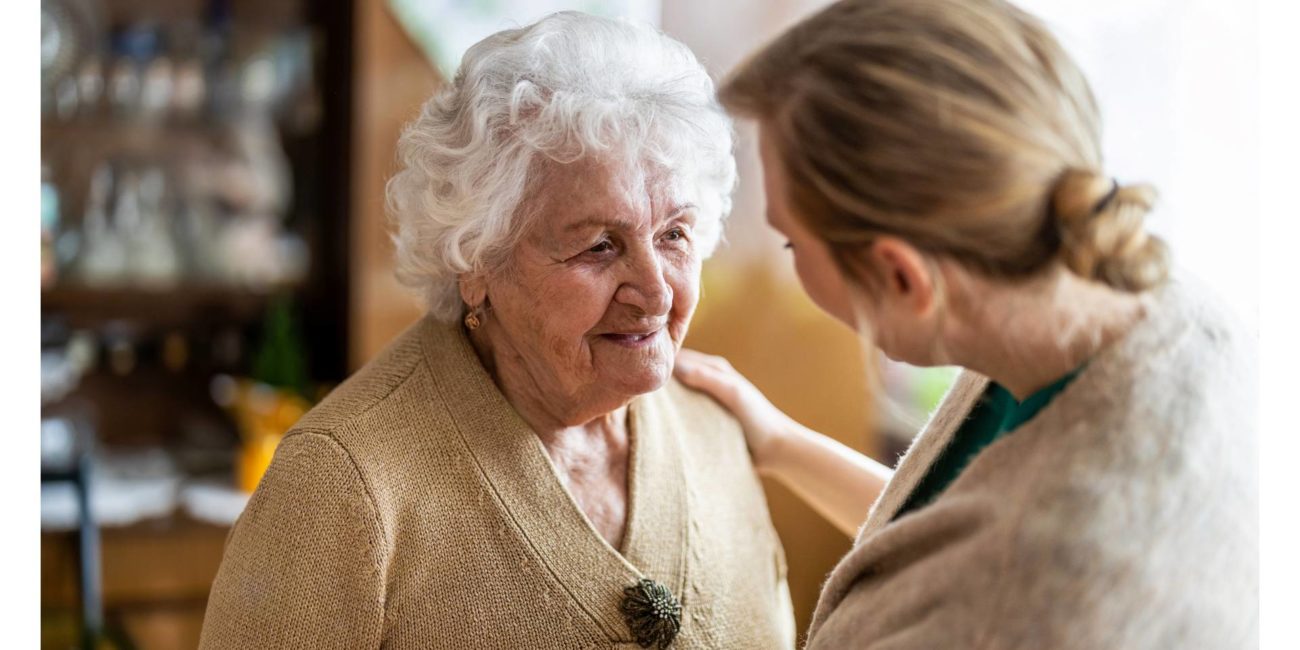When our loved ones age, usually the highest priority is supporting them through physical changes and needs. Whether it is modifying their home to be safer or helping them manage their medications, the physical safety of a loved one is important. Since we so profoundly love our aging adults, their safety is understandably a high priority! Therefore, it can be easy to sometimes overlook mental health needs in seniors since physical health is often the focus.
However, the Institute of Medicine of the National Academies has found that over 20% of aging adults struggle with at least one mental health issue. These mental health needs can stem from dementia, depression, bipolar disorder, and many other conditions. Therefore, for many seniors, there is a high need for mental health support alongside physical healthcare.
Supporting a senior parent with their mental health needs can seem like an overwhelming task. This may be especially true if we are already tending to many physical health needs. However, we can find support as we care for our loved ones both mentally and physically! And I am ready to be that support!

What Are the Most Common Mental Health Issues in Seniors?
Many folks face mental health concerns at some point in their life. However, seniors have unique mental health experiences and therefore needs. Specifically, many aging adults struggle with a few key conditions which can significantly affect their mental health. While everyone is different, below are a couple of common mental health issues that seniors face:
Dementia
Dementia is a word we hear tossed around a lot, and it can be confusing. Simply put, dementia is a general term used to describe the process when a loved one loses functions like memory, speech, problem-solving, and other cognitive abilities. Alzheimer’s disease is a common form of dementia.
Understandably, dementia can be an overwhelming experience for both a loved one and their family. Therefore, certain mental health struggles can pop up as a parent contends with dementia. It is important to note that dementia itself is not a mental health condition. Rather, it is something that often dramatically affects the mental health of a loved one.
The effects of dementia on a loved one’s mental health may look like:
- Anger or aggression, sometimes accompanied by outbursts
- Withdrawn and disinterest in activities
- Depressive states
- Sleep issues
- Agitation and relentlessness
Depression
Along with dementia, care for depression is sadly a common mental health need among seniors. As your parent ages, their daily lives are changing. Some of those changes might be big and noticeable, like limited mobility or no longer be able to drive. Or, those changes might be more subtle, like not feeling well after their favorite meal anymore.
Either way, coping with the changes of aging is hard. It can be hard for our loved one, and it can be hard for us too! Depending on how complicated this coping process is, a loved one may often go through bouts of sadness or frustration.
This is a common experience in the aging process as someone adapts to changes. However, suppose a loved one is continuing to struggle emotionally through their aging process. In that case, depression might actually be the root cause.
Often depression is underdiagnosed and undertreated in the elderly population. Many symptoms of depression are seen as “normal” aging frustrations or confused with symptoms of other co-occurring disorders. Therefore, it might be helpful to look for a few signs that might indicate a loved one is battling depression.
Below are some of those signs:
- Expressing feelings of emptiness or hopelessness
- Irritability or loss of interest in previous interests
- Changes in their eating habits (when it has not been medically advised)
- Decreased energy
- Talking of death more often, openly, or positively
- Unexplained aches, headaches, or migraines

The Overlap Between Dementia and Depression
Both dementia and depression can cause unique mental health needs in seniors. Therefore, as we care for our parents, we might not be sure exactly what mental health support they need. This is a common and understandable source of confusion as a caregiver! This confusion might stem from the fact that these two diseases often overlap or are mistaken for the other.
Sometimes, depression is medically misdiagnosed as dementia and vice versa. Or, sometimes, depression accompanies dementia as a loved one progresses. In any case, these conditions should be independently treated and supported.
I encourage everyone to speak with their loved one’s medical provider about their loved one’s mental health and the ways to support them. They can help navigate any overlap in dementia, depression, or other mental health needs and equip a family with supportive resources!

How Mental Health Affects a Loved One's Physical Health
As our loved ones age, we undoubtedly have spent a lot of time and energy helping them stay safe and comfortable. This support is so crucial for a happy and healthy aging journey. However, our loved ones’ physical health is affected not only by their bodies but also by their brain chemistry. Meaning, there is a strong connection between a loved one’s mental and physical health!
Our loved ones’ mental health can affect their physical health in a variety of ways. First, if a parent struggles with a mental health need, such as depression, it could interfere with their physical health goals.
For instance, some aging adults who are experiencing depression struggle to consistently take medications due to forgetfulness or apathy. Or, a loved one who is more withdrawn due to a mental health need might stop going for their daily walks, affecting their overall heart health.
Second, unaddressed mental health needs in seniors could cause physical symptoms. Some aging adults facing mental health struggles complain of aches, pains, headaches, and other physical ailments. Even digestive problems and cramps can be traced to mental health causes.
The good news is that treatment for a loved one’s mental health needs has both physical and emotional benefits. As we seek to support our parents’ mental health, we are supporting their physical health as well!

How to Find Help for a Parent with Mental Health Needs
As we navigate conversations in our families around mental health, sometimes we feel overwhelmed or unsure of what to do next. It can be intimidating to care for a loved one not only physically but also mentally. However, there are resources available for a loved one. Let’s unpack a few ways our loved ones can be supported in their mental health needs.
Starting with Conversation
The best way to understand what a parent is feeling is to talk about it. We all sometimes struggle to talk about our feelings; it can be awkward or vulnerable! However, the more information we have regarding a parent’s mental health, the better we can support them. Below are a few tips on how to talk about mental health with a parent:
- Approach the conversation when everyone is in a calm state
- Ask open-ended questions (e.g., “What is one word to describe the way you feel lately?”)
- Gently point out changes and ask them if they can explain them (e.g., “Mom, I’ve always known you to love watching the birds! Lately, it seems like you don’t like it anymore. Why is that?)
- If at first, they don’t open up, keep patiently trying
- If the conversation becomes escalated, take a break and try another time
- Normalize mental health issues in the elderly
Connect with A Medical Professional
If a loved one is ready to take the next step in receiving mental health support, seek medical counsel. Most families start with their parent’s primary doctor to discuss the next steps.
Sometimes a doctor will be able to diagnose an issue and use medication to manage it. Or they might refer a loved one to a specialist or therapist. Once understanding specifically what mental health needs a parent has, many medical offices can link families to local support networks as well.
Create A Care Plan
With our loved one’s medical professional, we can focus on creating a care plan. If medication will be involved, discuss strategies for safe medication management. If a specialist is involved, communication with them will help support the work they’re doing with a parent.
We can consider ways we can support consistency and access support groups or networks for our loved ones. A clear care plan will help support emotional health for everyone!

What To Do When an Elderly Parent Refuses Care or Is Being Difficult
Mental health is a touchy subject, especially for many aging adults. For many older parents, they have been the caretakers most of their lives. And suddenly needing emotional support rather than offering it can be an uncomfortable position. Therefore, a parent may become difficult or even refuse help sometimes.
Asking Questions
If a parent is refusing your help, try to approach the conversations creatively. First, focus on asking questions to understand the root of why they are being difficult. Are they ashamed of needing help? Are the cognitively not understanding why they need assistance? When we understand our loved one’s side of the story it gives us information on how to approach a solution.
Share Honestly
Next, be honest about any concerns and worries. Positively explain your love and care for them and how helping them would make you feel happy. Frame the conversation in a way where they can be the hero.
Meaning, instead of making them feel like a burden, focus on how letting you support them actually helps YOU out! Finding a way that makes them the hero might encourage a parent to be open to your ideas and solutions.
Offer Options
Finally, always try to give a loved one options when possible. If our loved ones feel like they are part of the solution instead of just consenting to it, they might be open to collaborating. For instance, if a loved one is battling taking medication for their mental health diagnosis, offer alternatives they are comfortable with.
Would they be willing to meet with a therapist instead for a few months to see if that helps? Would they be willing to go to therapy if they got to choose someone to go with? Are they willing to take this medication if someone calls and checks in each time for the first couple of weeks? Sometimes we can find solutions with difficult parents when we explore more than one option for success.
Ultimately, no matter how careful we tackle these conversations, sometimes a parent will still refuse necessary help. If you find yourself in this challenging situation, consider outside help, like another family member, mediator, or even legal counsel if applicable and necessary.

Maintaining Our Own Mental Health
While we support our loved ones in their mental health journey, it is important to not lose sight of our own mental health needs. Creating space for our own self-care will actually create sustainability in our caregiving role.
Don’t be afraid to make boundaries when needed to and prioritize personal needs. Our mental health needs are equally important, and our example of investing in our own emotional health could be profoundly impactful on our loved ones.

Supporting Health for the Whole Family
At Beverly’s Daughter, I seek to support our loved one’s health at every level: physical, mental, and emotional. Moreover, I am committed to promoting health for the whole family as they act as a support network. However, I understand that navigating mental health needs in seniors can be a daunting path. I am ready to partner with you in this journey. Whether you are not sure how to have a conversation with your parent or looking for a support group, I am here to help.




Leave a Reply